| Develop Building Integrity and Transparency Strategy and Action Plan for the CityHall of Zugdidi Municipality |
USAID Good Governance Initiative in Georgia, Tetra Tech ARD |
2020 |
GEL 44,025 |
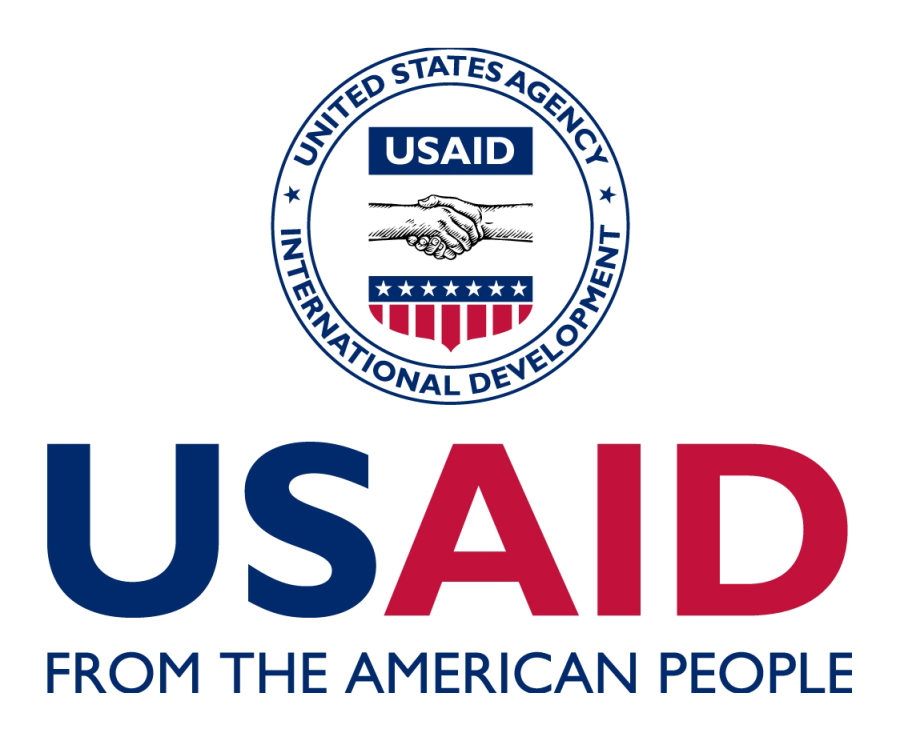 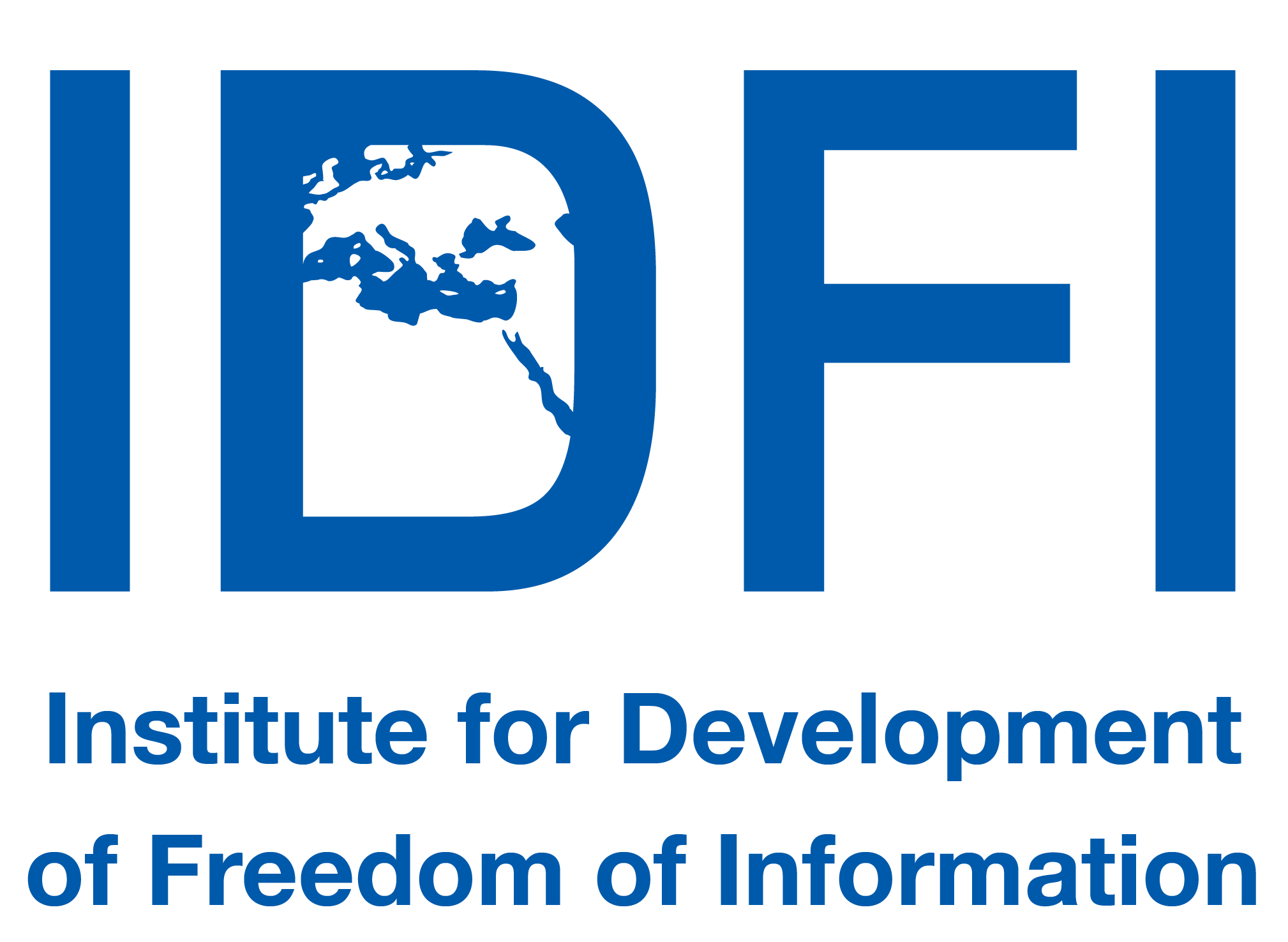
Project Title: Develop Building Integrity and Transparency Strategy and Action Plan for the CityHall of Zugdidi Municipality
Donor Organization: USAID Good Governance Initiative in Georgia, Tetra Tech ARD
Project Contract Number: GGI-SUB-037
Total Budget: 44,025 GEL
Duration of the Project: 02 March, 2020 – 31 August, 2020
Objectives
The overall objective of the project is to strengthen resilience of Zugdidi City Hall system against the threat of corruption.
Specific objective of this assignment is to support Zugdidi City Hall in:
1) Development of Building Integrity and Transparency Strategy, subsequent Action Plan, together with indicators and monitoring framework;
2) Capacity building of the relevant staff to successfully apply anti-corruption measures in practice.
Project Activities
In order to achieve the above-mentioned objectives, IDFI will implement the following activities:
- Development of a detailed methodology
- Development of a detailed work plan
- Conduct a comprehensive situational analysis
- Preparation of Situation Analysis Report and Recommendations
- Presentation of findings and recommendations
- Development of draft Strategy and Action Plan
- Conduct Public Discussion
- Finalizing Strategy and Action Plan
- Development of a Training Module
- Conduct a capacity building activity
- Submission of final deliverables
Planned Activities
Project Budget
Contract
Grant agreement
|
The overall objective of the project is to strengthen resilience of Zugdidi City Hall system against the threat of corruption
View more →
|
| Core Support |
The Swedish International Development Cooperation Agency (Sida) |
2020-2022 |
SEK 9,100,000 |
 
Project Title: Core Support
Supported by: The Swedish International Development Cooperation Agency (Sida)
Grant Number: No. 13382
Budget: SEK 9,100,000 (Swedish kronor)
Duration: January 1, 2020 - December 31, 2022
Objectives of the Core Activities
The overall objectives of the Core Activities are Supporting Democratic and Good Governance in Georgia through evidence-based research, monitoring and advocacy by a) Promoting Open Governance; b) Strengthening the Anti-Corruption System; c) Social and Economic Policy; d) Rule of Law; e) Facilitating the Decentralization Process; f) Supporting the Process of Democratic Transition in Georgia; g) Media and Freedom of Expression; h) Internet and Innovations.
Project Summary
Despite overall progress in terms of building a democratic state and improving the effectiveness, transparency and fairness of governance in Georgia over the past 20 years, these processes have slowed and are currently facing serious challenges, such as informal governance, concentration of power, lack of judicial independence, high-level corruption and lack of political will to continue with important reforms, as well as poverty, external political and economic pressure from the Russian Federation that negatively affects democratic processes in the country. Reputable international organizations as well as prominent Georgian civil society organizations have gone as far as to say that Georgia shows signs of state capture. While the Government of Georgia declares that country irreversibly keeps pro-Western, Euro-Atlantic, democratic course, these worrying trends show a clear necessity for civil society to focus on these direction and support Georgia’s democratic and pro-western development as much as possible within its competence.
Having 10 years of experience working on improving democratic processes and promoting the principles of good governance, IDFI intends to counteract the existing challenges facing democratic and good governance through evidence-based research, monitoring and advocacy. More specifically, IDFI will work towards key objectives of combating corruption, improving transparency of public institutions, increasing citizen engagement in decision-making processes, achieving higher standards of rule of law, promoting more inclusive economic policies, facilitating the democratic decentralization and the democratic transition processes, upholding media and human rights, and promoting innovations to solve outstanding problems.
To achieve these objectives, IDFI will work with all relevant public, private, and civil society stakeholders. The organization will also make active use of various national and international networks and platforms in order to achieve positive change in target areas. Finally, special attention will be paid to achieving results at scale, by engaging important cross-cutting issues, such as education, environment and gender.
Budget
Contract
Grant agreement
|
The overall objectives of the Core Activities are Supporting Democratic and Good Governance in Georgia through evidence-based research, monitoring, and advocacy
View more →
|
| Promoting Open Governance Principles at the Parliament of Georgia and Supreme Council of Ajara (SCA). |
European Union (EU) |
2019–2022 |
€290,000.00 |

Project Title: Promoting Open Governance Principles at the Parliament of Georgia and Supreme Council of Ajara (SCA). It is part of a broader initiative of the EU-UNDP project - “Consolidating Parliamentary Democracy in Georgia”.
Funded by: The European Union with a co-share from the Parliament of Georgia and SCA
Project Number: 00113526
Total Budget: EUR 290,000.00
Duration: November 11, 2019 – April 30, 2022
EU-UNDP project “Consolidating Parliamentary Democracy in Georgia” contributes to improved democratic governance in Georgia through strengthening the performance of the Parliament of Georgia and the Supreme Council of Autonomous Republic of Ajara (SCA) within the new context of constitutional and legislative framework.
In the framework of the project, UNDP is collaborating with the IDFI to promote open governance principles in the work of the Parliament of Georgia and SCA in order to enhance openness, transparency and accountability of the institutions, including through greater citizen engagement.
The cooperation aims at (1) enhanced public engagement in parliamentary processes through:
- supporting the operation of the Permanent Parliamentary Council on Open Governance
- supporting the Council in monitoring the implementation progress of Open Parliament Action Plans
- supporting the Parliament in raising public awareness on openness reforms and promoting citizen participation in legislative processes
- building the capacity of the Communications Teams of the Parliament on social network content management and tools
- supporting the building and reinforcing partnerships between the Parliament and other OGP member parliaments
and (2) SCA’s increased institutional openness, transparency and citizen engagement through:
- facilitating the institutionalization of a legislative openness mechanism in the SCA
- providing support to the SCA’s working group on legislative openness
- supporting the SCA’s working group in developing and monitoring the implementation of openness action plans
The project targets: members and staff of the Parliament of Georgia and SCA, civil society organizations, youth, ethnic minorities, academia, media, and the public in general.
Contract
Budget
Planned Activities
Grant agreement
|
In the framework of the project, UNDP is collaborating with the IDFI to promote open governance principles in the work of the Parliament of Georgia and SCA in order to enhance openness, transparency and accountability of the institutions, including through greater citizen engagement.
View more →
|
| Experience Sharing in Public Procurement |
Partners for Transparency Foundation |
2019 |
$16,000 |
 
Project Title: Experience Sharing in Public Procurement
Funded by: Partners for Transparency Foundation
Total Budget: $16,000
Duration: November 21, 2019 – November 22, 2019
Background:
Fighting corruption in the field of public procurement is one of the important issues that need to be discussed. Sharing experiences and good practices between countries in this field helps to analyze problems and challenges and find ways to solve them.
Project Description:
In the framework of the project, the Institute for Development of Freedom of Information (IDFI) in the cooperation with PTF India (Partners for Transparency Foundation) will organize the Study Program “Experience Sharing in Public Procurement”.
Project Goal is to share good practices and drawbacks in the Georgian public procurement system and Georgia's anti-corruption system and policies to the heads of Anti-Corruption Study Program Departments of public entities of the Federal Republic of India and high officials of state-owned enterprises.
/public/upload/Magda/other/Agreement.pdf
Grant agreement
|
In the framework of the project, the Institute for Development of Freedom of Information (IDFI) in the cooperation with PTF India (Partnership for Transparency Fund) will organize the Study Program “Experience Sharing in Public Procurement”
View more →
|
| Contributing to PAR through Civic Monitoring and Engagement |
European Union (EU) |
2019-2022 |
€499,435.55 |
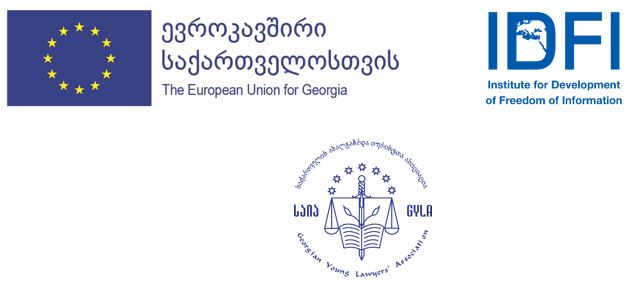
Project Title: Contributing to PAR through Civic Monitoring and Engagement
Funded by: European Union
Implemented by: Institute for Development of Freedom of Information (IDFI) and Georgian Young Lawyers’ Association (GYLA)
Project Number:ENI/2019/409-956
Total Budget: EUR 499,435.55; European Union: EUR 449,492; Partners Match: EUR 49,943.55 (IDFI - EUR 259,611.32 and GYLA - EUR 239,824.24)
Duration: October 10, 2020 – October 10, 2022
Background
Georgia launched the Public Administration Reform (PAR) in 2015 after signing the Association Agreement with the EU. The general goal of the reform is to improve the transparency, predictability, accountability and efficiency of the public administration of Georgia. For the past 4 years, successful implementation of PAR has been limited. According to Government of Georgia (GoG) PAR implementation monitoring results, 122 activities were assessed, out of which 55 were fully accomplished, 33 - mostly accomplished, 22 - partially accomplished, and 12 were not fulfilled. In addition to slow pace of implementation, several past obligations within the reform have been left unfulfilled for the most part of PAR’s existence. For example, an integral part of PAR, adoption of a separate Law on Freedom of Information has not been fulfilled, despite it being part of the reform since 2015.
Generally, PAR lacks ambitious reforms, especially in the areas of transparency and accountability. If the previous PAR action plan included the national anti-corruption action plan, the current one omits this important element. Local governments are not part of PAR to the extent they should be and regional CSOs are not engaged in the oversight of the reform. Also, public participation and oversight in the implementation of PAR has been one of the weakest links of the reform, which hinders its successful implementation. The need to improve regional engagement and participation has been recognised by the Government in its Programme 2018-2020.
In order to ensure that the third PAR action plan is implemented to the greatest extent possible and that the work is done to prepare for future improvement of the reform, implementing organizations (IDFI, GYLA, and regional CSOs) plan to promote civil society engagement in the monitoring and revision of the Public Administration Reform through innovations, capacity building and multi-stakeholder dialogue.
Action Objectives
The action aims to promote the implementation of the Public Administration Reform through innovations, capacity building, multi-stakeholder dialogue and civil society engagement in monitoring and revision of the PAR Action Plan.
Specific Objectives of the action are the following:
1. Monitor the implementation of PAR through an innovative, inclusive approach
2. Strengthen capacity of local CSOs to better contribute to oversight and implementation of PAR
3. Facilitate PAR revision process through multi-stakeholder discussion and sharing of best practices.
Action Major Activities
IDFI and GYLA will monitor the implementation of Public Administration Reform, with particular focus on 4 components: policy development, accountability, public finance management and service delivery in order to identify the strengths and weaknesses of the implementation process, allowing for evidence-based revision. The assessment will serve as an alternative monitoring report, complementing and verifying the report of the GoG. Once unfulfilled commitments are identified, the project team will examine the principal reasons of failure and propose ways of addressing them. These observations will then be used by the implementing organizations for the revision of PAR and its action plan.
A single interactive and dynamic monitoring platform will be an integral part of the monitoring process. Monitoring and research results will be stored on this platform. For this purpose IDFI will create an online monitoring platform - PAR Tracker, that will grant the public and all interested stakeholders ready access to comprehensive information about PAR implementation, as well as means to engage in the monitoring process.
GYLA will train 11 local CSOs in at least 6 cities in Georgia (Akhmeta, Batumi, Kutaisi, Zugdidi, Poti and Marneuli), four of which have the self-governing status, while the fifth and sixth are populated by ethnic minorities (Muslim Kists in Akhmeta and Azerbaijanis in Marneuli). After the trainings, GYLA will select CSOs in each city via a competition, and issue small grants to them to assess implementation of PAR reform at local level and identify shortcomings and opportunities through public discussions and workshops with the participation of all relevant local stakeholders.
In an effort to facilitate PAR reform revision process, IDFI will study best practices on the most problematic issues identified by PAR Tracker and elaborate policy recommendations, which will be communicated to all relevant stakeholders and decision-makers through workshops and roundtable discussions. IDFI will also make active use of its media network to raise awareness about the reform, in an effort to stimulate public demand for more ambitious reform commitments. Finally, at the end of the project, IDFI and GYLA will hold a conference to gather all relevant stakeholders to advocate for improvements and ambitious commitments for the future of Public Administration Reform.
The logic behind the action is that by creating an online platform for monitoring PAR, CSOs which are part of the PAR Council will be equipped with an effective common monitoring tool, and other CSOs, not part of the process, with area specific expertise will be given the opportunity to contribute to the reform. The PAR tracker will act as a bridging mechanism allowing target groups and beneficiaries to share their feedback and concerns with public institutions that are responsible for policy making, service delivery and PAR implementation.
This systemic and innovative approach to monitoring will help identify all key challenges facing the reform. IDFI and GYLA will then develop evidence-based recommendations to counter these challenges by consolidating the feedback gathered through the PAR Tracker as well as studying best international practices. Finally, the recommendations for how to revise PAR will be advocated using all relevant channels.
Activity Plan
Project Budget
Contract
Grant agreement
|
The action aims to promote the implementation of the Public Administration Reform through innovations, capacity building, multi-stakeholder dialogue and civil society engagement in monitoring and revision of the PAR Action Plan.
View more →
|
| Supporting the preparation of a South Caucasus study in Evidence-Based strategies on Combating Corruption |
Bertelsmann Stiftung |
2019 |
€2,000 |
Project Title: Supporting the preparation of a South Caucasus study in Evidence-Based strategies on Combating Corruption
Funded by: Bertelsmann Stiftung
Total Budget: EURO 2,000
Duration: September 9, 2019 – October 20, 2019
Project Description:
In the framework of the project, the Institute for Development of Freedom of Information (IDFI) will provide support in preparing a South Caucasus study in Evidence-Based strategies on Combating Corruption based on three countries (Georgia, Armenia, Azerbaijan) research report. IDFI will be engaged to assist the author of the study in preparation of country analysis of Georgia. IDFI will research and collect the content-relevant materials, and select interview partners in Georgia and conduct the interviews as needed.
The scientific work is dedicated to the analyses of the development on rule of law against the background of the fight against corruption and the handling of organized crime in Georgia. The scientific work provides the answers, among other issues, to the questions of which factors determine the success of the fight against corruption. As a result, scientific work also provides recommendations to civil society actors and external donors to strategic fight against corruption in country-specific context.
/public/upload/Magda/other/Bertelsmann.pdf
Grant agreement
|
In the framework of the project, the Institute for Development of Freedom of Information (IDFI) will provide the support in preparing a South Caucasus study in Evidence-Based strategies on Combating Corruption.
View more →
|
| Potential Gender-Determined Differences in Civil Service Career Paths in Georgia |
UNDP Georgia |
2019 |
$15,000 |

Project Title: Research project on potential gender-determined differences in civil service career paths in Georgia
Funded by: United Nations Development Program (UNDP) through Public Administration Reform (PAR) project
Contract Number: #00095872
Total Budget: USD 15,000
Duration: 15 July 2019 – 31 December 2019
Research project on potential gender-determined differences in civil service career paths in Georgia is the UNDP funded initiative implemented by the Institute for Development of Freedom of Information (IDFI).The project aims to identify the key ways in which gender determines differences in career paths and the extent to which these differences are perceived as detrimental to the individual civil servants and the civil service as a whole.
Secondary Objectives of the project are following:
- To study the satisfaction level of male and female employees towards the career system in civil service
- To identify possible challenges and differences for male and female employees in development of their career paths
- To measure the perception of the effect of these differences to the individual civil servants and the civil service
- To provide recommendations for the improvement of the civil service career system
Under the project IDFI will carry out a research which will answer the following questions:
- What is the journey of managerial level male and female civil servant from the beginning of the career and/or entering civil service to recent position?
- What are the perceptions of male and female civil servants on the necessity and benefits of the career development in civil service?
- What are the needs, challenges, and assumptions, positive and negative factors of/for male and female civil servants at each stage of career development?
- What are the perceptions of male and female civil servants on the effectiveness of the career development in civil service?
- What are the best practices in carer development and possible solutions of differences in career paths of civil servants?
The research project will contribute to a better understanding of the differences in career paths for female and male civil servants and will provide the recommendations on how to remove these differences.
Planned Activities
Project Budget
Contract
Grant agreement
|
The research project aims to identify the key ways in which gender determines differences in career paths and the extent to which these differences are perceived as detrimental to the individual civil servants and the civil service as a whole.
View more →
|
| Enhancing Openness of State Archives in Former Soviet Republics and Eastern Bloc Countries |
Open Society Institute Budapest Foundation |
2019-2020 |
$78,980.64 |

Name of Project: Enhancing Openness of State Archives in Former Soviet Republics and Eastern Bloc Countries
Donor Organization: Open Society Institute Budapest Foundation (OSI)
Total Grant Amount: $78,980.64
Project Number: OR2019-58650
Period of Performance: June 1, 2019 – May 31, 2020
Project Goal
Encourage the rethinking of Soviet and totalitarian past by fostering research and promoting the openness of state archives in post-Soviet and post-socialist countries. This goal is to be attained by two main objectives. Firstly, by expanding the ranking of the openness of Soviet and totalitarian archives to the Eastern Bloc countries. During the conference planned within the framework of the project meeting with new partners and experts of the project will be held. Additionally, a thorough study on the issues of post-Soviet space in terms of archive openness will be conducted to have clear vision on how and where to advocate for more openness.
Objective 1. Promoting the openness of state archives by expanding the State Archive Openness Rating. One of the main objectives of the project is expanding the network of NGOs to cover additional countries. The network will aim to launch active national and international advocacy campaigns to achieve changes in archives. Also, involved scholars will provide studies based on archival research and articles about Soviet past.
Objective 2. Facilitating Soviet and Totalitarian Memory Studies. In order to attract public interest towards archives and Soviet period, IDFI plans to expand the scope of the project and implement memory studies based on archival documents on Soviet totalitarian period. We aim to work in two following directions: Politics of Memory and Discourse on Memory.
In order to lay a foundation where relevant stakeholders are more receptive to change, IDFI will encourage partner scholars to write easily understandable articles and blogs for the broader public on various topics of interest from the Soviet period which will be based on archival documents. Well-known experts will be invited to write articles in order to contribute to our online resource –www.open-archives.org. The project will also involve young scholars to write articles alongside invited experts. The project team will also identify important articles already written on relevant topics and translate them in order to increase their reach. Finally, the project team will organize important information revealed as a result of archival work and prepare easily digestible visualizations and short videos to be disseminated in target countries.
Contract
Planned Activities
Project Budget
Grant agreement
|
Project goal is to encourage the rethinking of Soviet and totalitarian past by fostering research and promoting the openness of state archives in post-Soviet and post-socialist countries.
View more →
|
| Development of Educational Certification Program in Fighting Corruption |
Open Society Institute Budapest Foundation |
2019-2020 |
$80,397.42 |


Type of grant activity: Development of Educational Certification Program in Fighting Corruption![]()
Donor institutions: Open Society Institute Budapest Foundation (OSI) with co-funding from Open Society Georgia Foundation (OSGF)
Total grant amount: USD 80,397.42 (OSI - USD 65,397.42; OSGF - USD 15,000)
Project number: OR2019-58650
Implementation period: June 1, 2019 – November 30, 2020.
Project Goals
The impact of the project will be to develop and sustain a community of professionals and activists, who will engage with corruption prevention, corruption risk management and with shedding light on facts of individual and systemic corruption.
The first goal of the project is to develop an inter-disciplinary curriculum on corruption, its history and root causes, risk mitigation at policy development level, compliance within public and private organizations, the most modern corruption trends and methods of uncovering corrupt arrangements through open source investigation, whistleblowing and other methods.
The second goal of the project is to recruit a group of course participants with various backgrounds and a motivation to engage with the course, dedicate time and take an active part in the educational process through learning and sharing their thoughts, ideas and experiences; and to deliver a high-quality course.
The third goal of the project is to develop a strong alumni network of corruption fighters, who will continue their active work in their respective fields, and at the same time engage with periodic alumni activities, whether it will be attending an alumni gathering; organizing a joint research project; or exploring joint learning, or knowledge sharing opportunities.
Expected Impact
Short-term impact: development of a cutting-edge inter-disciplinary certification program;, engaging the prominent local and international experts in delivery of the course; graduating the first cohort and launching alumni network among graduates.
Medium-term impact: impacting attitude of course participants by equipping them with the necessary knowledge and skills, which will enable them to act as role models and change agents at their work, or through various projects that they will chose to engage with.
Long-term impact: contribute to development of a community of like-minded progressive professionals, who are capable of recognizing risks for corruption and preventing corruption, as well as who will uncover corrupt practices and form a critical public opinion about the real human cost to corruption.
Planned Activities
Project Budget
Contract
Grant agreement
|
The impact of the project will be to develop and sustain a community of professionals and activists – corruption hunters, who will engage with corruption prevention, corruption risk management and with shedding light on facts of individual and systemic corruption.
View more →
|
| Studying How Major International Anti-corruption Platforms Promote Transparent & Accountable Public Procurement in Georgia and Eurasia Region |
Open Society Institute Budapest Foundation |
2019-2020 |
$51,456.96 |

Name of Grant Activity: Studying how major international anti-corruption platforms promote transparent and accountable public procurement in Georgia and the Eurasia region
Donor Organization: Open Society Institute Budapest Foundation (OSI)
Total Grant Amount: 51,456.96 USD
Project Number: OR2019-58650
Period of Performance: 1 June 2019 – 30 November 2020
Project Description and Goal
The goal of the project is to secure Georgia’s democratic state-building achievements by tackling the growing problem of corruption, with a particular focus on corruption-proofing the public procurement system.
To pursue this agenda on the national level IDFI will work to maximize the effect of such international anti-corruption platforms as the Open Government Partnership (OGP), Council of Europe’s Group of States against Corruption (GRECO), and Anti-Corruption Network of the Organization for Economic Co-operation and Development (OECD-ACN). IDFI will also look at Georgia’s National Anti-Corruption Strategy and Action Plan as a framework for assessing the Georgia public procurement related policies, to make sure the country fulfills its international obligations and reduce the scale of corruption in interests of Georgian population. IDFI will also continue its work of building an international network of CSOs working on public procurement and consolidating their efforts to make the voice of civil society heard by major national and international stakeholders and decision makers.
Objective 1 - Fortify the Georgian public procurement system against corruption by developing systemic improvements. In order to ensure that the ongoing legislative reform does not lose sight of the practical aspects of how public procurement is run in Georgia, IDFI will analyze the most prominent corruption loopholes of the Georgian public procurement system and develop policy papers, in cooperation with all relevant stakeholders, offering best practice and evidence-based, systemic improvements to the system of public procurement.
Objective 2 - Amplify the effect of all major anti-corruption platforms in Georgia, with a focus on improving the public procurement system. IDFI intends to harness and amplify the positive effect various international anti-corruption platforms have on Georgian reform environment in order to secure tangible anti-corruption commitments and actions from relevant state actors. Particular attention will be paid to securing commitments that tackle corruption in the Georgian public procurement system.
Project Activities
Objective 1
- Elaborating policy proposals targeting specific corruption related loopholes in the Georgian public procurement system.
- Holding public discussions on each policy proposal developed as part of the project.
- Harnessing the Georgian public procurement reform to strengthen the TPPR international network of CSOs working on public procurement.
Objective 2
- Assessing the quality of implementation of Georgia’s anti-corruption commitments within the OGP National Action Plan (NAP) of 2018-2019.
- Assessing Georgia’s compliance with the National Anti-Corruption Strategy commitments.
- Assessing Georgia’s compliance with GRECO recommendations.
- Assessing Georgia’s progress on Implementing the OECD-ACN Recommendations andContributing to the latest Round of Evaluation.
Planned Activities
Project Budget
Contract
Grant agreement
|
The goal of the project is to secure Georgia’s democratic state-building achievements by tackling the growing problem of corruption, with a particular focus on corruption-proofing the public procurement system.
View more →
|
| Develop Open Data Strategies and Action Plans for Kutaisi and Akhaltsikhe City Halls (2019-2020) |
USAID Good Governance Initiative in Georgia / Tetra Tech ARD |
2019 |
$18,578 |
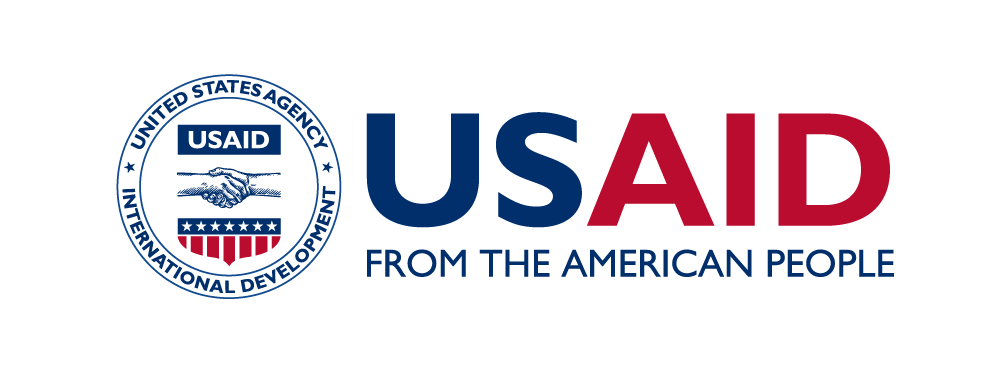
Project Title: Develop Open Data Strategies and Action Plans for Kutaisi and Akhaltsikhe City Halls (2019-2020)
Donor Organization: USAID Good Governance Initiative in Georgia, Tetra Tech ARD
Project Contract Number: GGI-SUB-023
Total Budget: 50,160 GEL ($18,578)
Duration of the Project: 03 May, 2019 – 20 October, 2019
Objectives
The objective of GGI is to support Akhaltsikhe and Kutaisi City Halls in improving open data collection and publishing process and ensure release of open government data in a way that will make it more accessible, interoperable and reusable. The ultimate goal of GGI is to support its partner municipalities in the publication of valuable datasets to meet the existing demands from all stakeholders, including private sector, civil society, media, academia, etc.
The specific objective of this project is to provide technical assistance to Akhaltsikhe and Kutaisi City Halls in developing Open Data Strategies and Action Plans (2019-2020) and monitoring frameworks that will ensure improved data management, including better practices of data disclosure, which is an important element of a wide variety of key policy documents and action plans.
Project Activities
In order to achieve the above-mentioned objectives, IDFI will implement the following activities:
- Development of a detailed methodology
- Development of a detailed work plan
- Conduct comprehensive situational analysis
- Preparation of Situation Analysis Report and Recommendations
- Presentation of findings and recommendations
- Development of draft Strategies and Action Plans
- Conduct Public Discussion (focus group)
- Finalizing Strategies and Action Plans
- Development of Training Module
- Conduct capacity building activities
- Submission of final deliverables
Timeline of Activities
Project Budget
Contract
Grant agreement
|
The specific objective of this project is to provide technical assistance to Akhaltsikhe and Kutaisi City Halls in developing Open Data Strategies and Action Plans (2019-2020) and monitoring frameworks that will ensure improved data management, including better practices of data disclosure, which is an important element of a wide variety of key policy documents and action plans.
View more →
|
| Providing Assistance to the Open Governance Permanent Parliamentary Council to Conduct Thematic Inquiry on the Subject of Legislation and Practice of Citizen Participation in the Process of Public Policy Development at the Executive Branch of Government |
United Nations Development Program (UNDP) |
2019 |
$5,613 |

Project Title: Providing Assistance to the Open Governance Permanent Parliamentary Council to Conduct Thematic Inquiry on the Subject of Legislation and Practice of Citizen Participation in the Process of Public Policy Development at the Executive Branch of Government
Donor Organization: United Nations Development Program (UNDP)
Total Budget: $5,613
Duration of the Project: May, 2019 – November 2019
Project Description
On May 29th, 2019 Open Governance Permanent Parliamentary Council (the Council) created a thematic inquiry working group (the Working Group) for studying existing practice and legislation of citizen participation in the process of public policy development in Georgia. Through the parliamentary oversight mechanism, the Council aims to study and support the process of participatory decision-making at the executive branch of governance (ministries and the Government Administration (AoG)).
The decision of the Council to conduct the thematic inquiry derived from the poor state of participatory decision-making in Georgia. Ensuring citizen participation in the process of elaborating public policy documents, is one of the declared priorities of the government (see: Open Government Partnership Action Plan of Georgia 2018-2019, Challenge 1, Commitment 2; Association Agenda between the European Union and Georgia 2017-2020, Priority 2.2; Public Administration Reform Roadmap 2020, Policy Area 1). However, no significant progress has been made in this regard in recent years. According to the Baseline Measurement Report of the OECD program - Support for Improvement in Governance and Management (SIGMA), Georgia received the lowest 0 score evaluation in regards to public consultations in the process of public policy development.
IDFI as a member organization of the Consultative Group created within the Council and an NGO with in-depth knowledge and experience on the subject of participatory decision-making will provide the Working Group with expert assistance necessary for planning, conducting and finalizing the thematic inquiry.
Project Objective
The main objective of the project is to enable the conduct of the thematic enquiry. For this purpose IDFI will draft all necessary preparatory documents, participate in meetings and hearings of the thematic enquiry, analyze materials, study best international practice and develop the final report of the thematic inquiry. IDFI will agree and discuss all the materials with the members of the working group before they are officially registered at the Parliament of Georgia. The main project deliverable will be the final report of the thematic inquiry prepared by IDFI and approved by the Working Group. The final report will inter alia include the main findings in regards with the practice and legislation of participatory decision making at the central public institutions of the executive branch and relevant recommendation dwelling from existing problems and based on the best international standards.
Project Action Plan
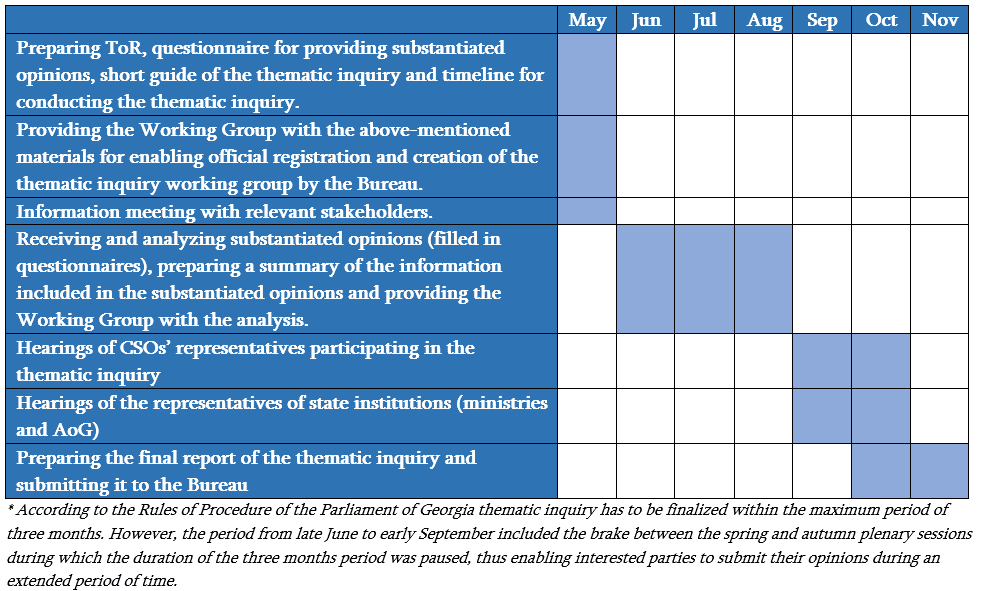
Grant agreement
|
IDFI as a member organization of the Consultative Group created within the Open Governance Permanent Parliamentary Council and an NGO with in depth knowledge and experience on the subject of participatory decision-making will provide the Working Group with expert assistance necessary for planning, conductingand finalizing the thematic inquiry.
View more →
|
| Empowering Watchdog Community for Government Accountability |
International Visegrad Fund |
2019-2020 |
€33,670 |

Project Title: Empowering Watchdog Community for Government Accountability
Supported by: International Visegrad Fund
Grant Number: 21830043
Budget: EUR 33,670
Duration: March 1, 2019 – February 29, 2020
Partner Organizations: KohoVolit.eu (Czech Republic and Slovakia), K-Monitor Public Benefit Association (Hungary), ePaństwo Foundation (Poland)
Project Contact Person: Levan Avalishvili
Project Objectives
The project aims to empower Georgian public to effectively monitor and control the government, and enhance availability of public data.
1) Increase capacity of journalists, CSOs and activists through enhancing their oversight skills and promote conducting watchdog activities;
2) Enhance access to open data in Georgia through local advocacy efforts.
Such holistic approach will significantly improve the environment for the watchdog community through enriching their professional skills, fostering cooperation between CSOs, investigative journalists and activists and opening more public data. This approach will also expand the number of highly qualified watchdogs and investigative journalists throughout the country, who will have enough skills to follow spending of public money. By promoting watchdog activities the project will also increase public support for good governance in the country. Sharing experience of our partners from Visegrad countries will be crucial in this regard.
Project Activities
1. Preparing a toolkit/practical manual for trainings
2. Consultations with project partners from Visegrad countries
3. Workshops/practical trainings
4. Providing consultations to journalists/activists/CSOs/watchdogs
5. Preparing analytical/investigative articles
6. Preparing visualizations and informative videos
7. Preparing datasets and further development of DataLab.ge
8. Contest of analytical/investigative reports/articles
9. Workshops on open data
10. Final presentation
Timeline of Activities
Project Budget
Contract
Grant agreement
|
The project aims to empower Georgian public to effectively monitor and control the government, and enhance availability of public data.
View more →
|
| Access to Information in Georgia - 2018 |
USAID / EWMI ACCESS |
2019 |
$15,000 |

Project Title: Access to Information in Georgia - 2018
Funded by: East-West Management Institute’s (EWMI) Advancing CSO Capacities and Engaging Society for Sustainability (ACCESS) project, funded by United States Agency for International Development (USAID)
Project Contract Number: G-1599-19-210-3023-20
Implemented by: Institute for Development of Freedom of Information (IDFI)
Total Budget: 15,000 USD
Duration: 15 March – 15 June (2019)
Objectives
IDFI will submit FOIA requests to all ministries and local government agencies (i.e. executive and legislative offices) and analyze received responses in terms of their compliance with the FOIA regulations in Georgia. It will also request and analyze the official statistical information on the FOIA databases (i.e. received and processed FOIA requests) maintained by the monitored government agencies. Additionally, IDFI will analyze the official websites of the monitored agencies to assess their compliance with the government regulation on the proactive disclosure of public information. Based on this monitoring and assessment, IDFI will develop and publish a comprehensive report on the FOIA adherence to Georgia to be accompanied with a national ranking of the most- and least-open government agencies.
Project Activities
- Analyze responses to IDFI’s FOIA requests to central and local government agencies (2,000+ FOIA responses from over 250 government agencies);
- Analyze official statistics on the FOIA requests received and processed by the government;
- Analyze governmental websites to assess their compliance with the proactive disclosure regulations;
- Prepare and publish a comprehensive report analyzing government’s adherence to the FOIA and proactive disclosure rules and regulations;
- Prepare and publish the national ranking of the most- to least-open government agencies;
- Organize the public presentation of the FOIA report and ranking and award most transparent and least transparent government agencies with respective certificates
- Upload government’s responses to IDFI’s FOIA requests on the special FOIA database developed and maintained by IDFI https://idfi.ge/foi-statistics/;
- Widely disseminate the project findings using info graphics, short videos, and other user-friendly communication tools
Timeline of Activites
Project Budget
Contract
Grant agreement
|
The main aim of the project is to monitor, evaluate, and publicize the Georgian government’s adherence to the Freedom of Information (FOIA) regulations.
View more →
|
| Good Governance for Georgia (3G) |
Luminate |
2019-2022 |
$390,000 |

Project Title: Good Governance for Georgia (3G)
Supported by: Luminate, Global Philanthropic Organization
Grant Amount: USD 390,000
Grant Term: January 1, 2019 – April 30, 2022
Project Description
Project aims at increasing public oversight of state institutions, and increasing transparency and accountability of the government of Georgia.
IDFI plans to accomplish this goal by conducting oversight activities related to monitoring of effective, responsible, transparent, ethical and accountable governance and public procurement activities, preparing investigative analyses, and increasing capacity of journalists, CSOs and activists to enhance their oversight skills and methods in the respective areas.
Initially, the project will pilot in Tbilisi (capital of Georgia) and gradually move to the rest of the country during the second and third years.
The project will include the following activities:
- Promote anti-corruption agenda, access to public information, government transparency and accountability by preparing monitoring reports and in-depth analytical papers about implementation of fiscal policy at central and local government levels in Georgia;
- Based on IDFI’s practice, develop a practical toolkit about the use of open data and existing online and offline resources and mechanisms for government oversight;
- Hold practical trainings and workshops for the project’s target groups: journalists, local CSO representatives, activists and business sector representatives;
- Launch a monitoring process with the participation of trained journalists, CSO representatives and activists.
Project Budget
Contract
Grant agreement
|
Project aims at increasing public oversight of state institutions, and increasing transparency and accountability of the government of Georgia.
View more →
|
| PPD Quality Tracking in Georgia – Continuation |
Governing for Growth (G4G) in Georgia Program, Deloitte Consulting / USAID |
2018-2019 |
$25,000 |
 
Project Name: PPD Quality Tracking in Georgia – Continuation
Donor Organization: Governing for Growth (G4G) in Georgia Program, Deloitte Consulting LLP /USAID
Project Number: RFA #2018 - 016
Grant Amount: 25,000.00 USD
Period of Performance: December 20, 2018 – July 12, 2019
Project Description
Institute for Development of Freedom of Information (IDFI) will continue implementing PPD Quality Tracking in Georgia. A regular, institutionalized platform for Public-Private Dialogue (PPD) will extend to future policy-making and development of legislation. In addition to assessing extent and quality of PPD at central public institutions (ministries), IDFI will raise awareness about high-quality PPD in the regions of Georgia (three selected municipalities - Rustavi, Telavi, Ozurgeti).
The objective of this grant is to continue implementing “PPD Quality Tracking Mechanism” for which each major law or regulation proposed by selected key ministries with considerable economic impact will be evaluated upon the extent and quality of inclusive consultation and assigned a rating in terms of four PPD quality parameters:
- Policy Design and Development
- Legislation/Policy Drafting
- Regulatory Impact Assessment (RIA)
- Circulation and public comment
As a result, public discussions in Tbilisi and selected target regions will be arranged; Periodic and Annual Reports on Evaluations of Laws, will be produced; and Draft law with the highest evaluation in terms of extent and quality of PPD will be awarded.
Planned Activities
Project Budget
Contract
Grant agreement
|
Project is designed to, among other things, facilitate a constructive dialogue between the public and private sectors by strengthening the capacity of both to effectively cooperate on policy and legislation.
View more →
|
| Supporting the Reform of the Supreme Court of Georgia |
East West Management Institute (EWMI)/Promoting Rule of Law in Georgia (PROLoG) |
2018-2020 |
$25,852 |

Project Title: Supporting the Reform of the Supreme Court of Georgia
Donor Organization: East West Management Institute (EWMI)/Promoting Rule of Law in Georgia (PROLoG)
Partner Organization: Georgian Young Lawyers’ Association (GYLA)
Project Number: G-1584-18-211-3024-20
Project Budget: 25, 852USD
Project Duration: 15 December, 2018 – 31 January, 2020
Project Summary
The project is about the institutional organization, authority and functions of the Supreme Court of Georgia, appointment, accountability, removal of Supreme Court Judges, as well as specialization and case distribution.
According to the new redaction of the Constitution of Georgia, Supreme Court Judges are elected permanently (without specific term) by the Parliament of Georgia. Candidates are presented to the Parliament by the High Council of Justice instead of the President of Georgia. The same rule applies to the election of the Chairperson of Supreme Court that is elected for 10 years. The project intends to present recommendations for the legislative changes on appointment of Supreme Court Judges. Moreover, final report will be prepared based on existing legislative framework and international standards.
Project aim
The main aim of the project is to support institutional reform of the Supreme Court of Georgia and to advocate legislative changes/amendments.
Main goals of the project
- Preparing comprehensive analysis of the current legislation and policy documents connected to the Supreme Court of Georgia and identifying existing challenges and gaps;
- Presenting recommendations on legislative changes taking into account international standards and best practices;
- Advocating recommendations to the suitable bodies.
Activity Plan
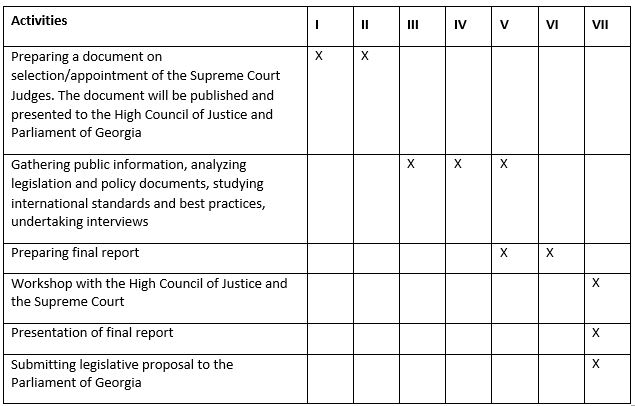
Budget
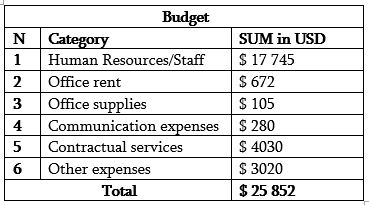
Grant agreement
|
The main aim of the project is to support institutional reform of the Supreme Court of Georgia and to advocate legislative changes/amendments.
View more →
|
| Developing the Transparency and Integrity Building Strategy and Action Plan for the Akhaltsikhe Municipality |
USAID Good Governance Initiative in Georgia / Tetra Tech ARD |
2018-2019 |
$13,074 |

Project Title: Developing the Transparency and Integrity Building Strategy and Action Plan for the Akhaltsikhe Municipality
Donor Organization: USAID Good Governance Initiative in Georgia, Tetra Tech ARD
Project Contract Number: GGI-SUB-015
Total Budget: 35,300 GEL ($13,074)
Duration of the Project: 11 October , 2018 – 15 March, 2019
Project Description
USAID Good Governance Initiative Project supports the Municipality of Akhaltsikhe in developing its governance capacities, including the area of fighting corruption on the local level.
The City Hall of the Akhaltsikhe Municipality made a commitment in the 2018-2019 OGP National Action Plan to strengthen its anticorruption system. The above-mentioned commitment includes development of a transparency and integrity strategy and action plan and their subsequent implementation. These activities will enable the Municipality of Akhaltsikhe to increase efficiency of its governance system, as well as boost transparency and accountability of institutions.
Aim of the Project
The project aims to support the City Hall of Akhaltsikhe in developing the transparency, accountability and integrity strategy and action plan, as well as increase capacity of municipal civil servants in the area of fighting against corruption.
Goals of the Project
In order to achieve the above-mentioned aim, IDFI will achieve the following goals throughout the project:
- To facilitate development of the transparency and integrity strategy and action plan, support creation of a working group in Akhaltsikhe City Hall;
- Analyze international experience in the fight against corruption on the local level, including recommendations/best practices of OECD, GRECO and their member states;
- Conduct a detailed situation analysis with regard to transparency, accountability and integrity in municipal public institutions of Akhaltsikhe;
- Based on the situation analysis, develop a draft strategy and action plan for increasing transparency and integrity;
- To increase capacity of local civil servants, develop a manual f about anticorruption best practices;
- Advocate for the formal adoption of the strategy and action plan and advocate for their integration in the National Anti-Corruption Action Plan.
Planned Activities
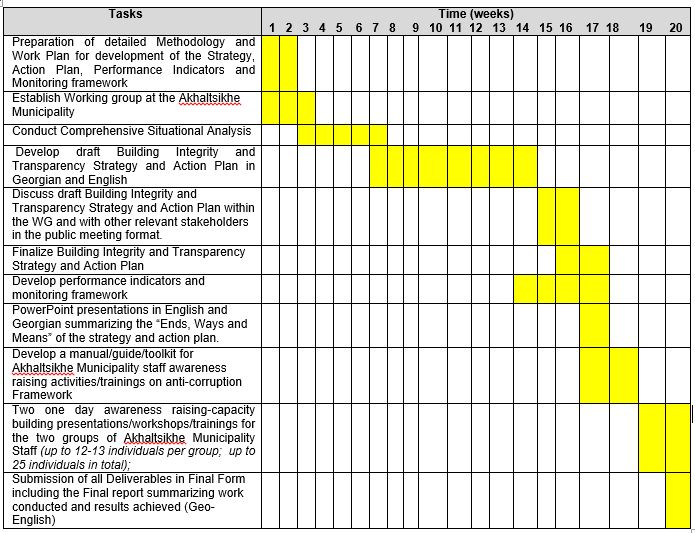
Budget

Contract
Grant agreement
|
The project aims to support the City Hall of Akhaltsikhe in developing the transparency, accountability and integrity strategy and action plan, as well as increase capacity of municipal civil servants in the area of fighting against corruption.
View more →
|
| Local Self-Government Index - 2019 |
Open Society Georgia Foundation (OSGF) |
2018-2019 |
$60,203 |

Project Title: Local Self-Government Index - 2019
Funded by: Open Society Georgia Foundation (OSGF)
Project Number: LDD/16/18 - 20828
Total Budget: USD 60,203 (IDFI budget – USD 23,910)
Duration: September 20, 2018 – July 22, 2019
Implemented by: Institute for Development of Freedom of Information (IDFI), Centre for Training and Consultancy (CTC) and Management Systems Development Center (MSDC)
Problem Statement (Situation Analysis)
Implementing reforms of local self-government and decentralization has always been on the Georgian political agenda over the past years. The latest wave of reform included the adoption of legislative changes to the Local Self-Government Code in 2014. A significant part of these changes aimed to enhance public participation in the decision-making process. Despite providing general legislative framework, new and further refined participatory mechanisms (general assembly of a settlement, council of civil advisors, petition, participation in meetings of representative bodies, and hearings of public officials), were implemented in municipalities incoherently.
There are several reasons for this, including lack of technical-material capabilities, experience and political will of municipalities. Awareness, willingness and skills of the local population to engage in political processes and contribute to solving local problems are equally important. According to recent polls, only 7% of the population is aware of the activities of their municipality.Also, the number of people who have information about newly introduced participation mechanisms is insignificant.
Apart from low public awareness, lack of proactivity and accountability of representatives of municipalities is another problem, which would encourage participation of local population in decision-making process. At the same time, the practice of proactive disclosure of public information among municipalities is uneven and negative. Even though, according to Georgian legislation, all administrative bodies are obligated to publish public information online, there are no common standards or policy regulating proactive disclosure of public information by public institutions. This problem is especially relevant for municipalities.
Project Goals
The ultimate goal of the project is to enhance public participation and ease risks of corruption in municipalities by improving practices of transparency and accountability in local government bodies.
To this end, the project aims to conduct follow-up assessment of municipalities in terms of openness and accountability based on Local Self-Government Index.
Project Objectives
- Update the e-platform lsgindex.org enabling the assessment of transparency and accountability of municipalities and compilation of a comparative ranking of Georgian self-governing bodies.
- Raise public awareness about the Local Self-Government Index.
- Further raise qualification of local monitors.
- Conduct monitoring of all self-governing bodies and elaborate recommendations based on monitoring results.
- Prepare and present a national report on transparency and accountability of municipalities.
Planned Activities
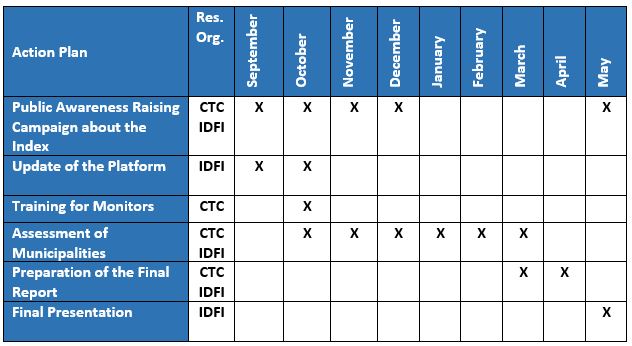
Budget
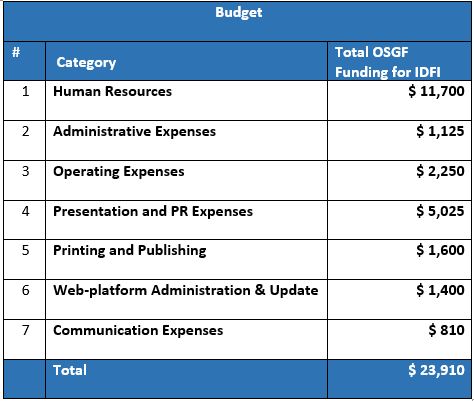
Contract
Grant agreement
|
The goal of the project is to enhance public participation and ease risks of corruption in municipalities by improving practices of transparency and accountability in local government bodies.
View more →
|
| Assessing Public Procurement Legislations and Practice in 9 Countries: Zimbabwe, Tanzania, Kenya, Malawi, Indonesia, Philippines, Guatemala, Bolivia & Costa Rica |
Hivos |
2018-2019 |
€28,450 |

Project Title: Assessing Public Procurement Legislations and Practice in 9 Countries: Zimbabwe, Tanzania, Kenya, Malawi, Indonesia, Philippines, Guatemala, Bolivia & Costa Rica
Donor Organization: Hivos
Total Grant Amount: 28,450 EUR
Project Number: 1017089
Project Start Date: September 2018 – May 2019
Project Summary
The project aims to assess Public Procurement Legislations (PPL) and their implementation in Zimbabwe, Tanzania, Kenya, Malawi, Indonesia, Philippines, Guatemala, Bolivia and Costa Rica with the use of the Transparent Public Procurement Rating (TPPR) Methodology to map the readiness of the target countries to adopt contemporary, modern and efficient public procurement systems, based on open data and the principle – “everybody sees everything”. The main goal of the project is to provide CSOs in target countries with the necessary tools for advocating changes in their respective public procurement systems.
Project Outline
Public procurement accounts for around one-fifth of global GDP. In the most high-income economies the purchase of works, goods and services accounts for a third of total public spending, making it especially important to manage the risk of corruption, collusion and other illegal practices in this area.
Without transparent public procurement systems, which are based on electronic means, are efficient and embrace open data, corruption may stay undetected from government authorities, watchdog organizations and the public. We believe that engaging in international collaboration between civil society organizations can create a stronger voice and better solutions to establish well-functioning public procurement systems.
Transparent and efficient public procurement systems also ensure citizens have equal access to public goods and services. For example, procurement systems of Georgia, Ukraine, Moldova or South Korea allow regular citizens to meaningfully engage in public resource allocation and monitor public expenditures.
Most countries in the Hivos “Open up Contracting” Portfolio have public procurement portals, however they lack contemporary elements, such as fully electronic procurement procedures built in the e-platforms; open data-based systems, which allow easy and fast access to procurement data; dispute settlement mechanism and its appropriate portal module, etc. These deficiencies are not only related to lack of technical expertise or financial resources in the country, but stem from incomplete legislative frameworks.
The main goal of the project is to map these deficiencies of public procurement legislative frameworks with the help of local partner CSOs in target countries, propose relevant legislative changes and assess whether the countries have the necessary legislative foundation to implement open, electronic and transparent public procurement system reforms. The project will create a mapping of public procurement systems in target countries and will provide an efficient advocacy tool for CSOs to change public procurement systems. Additionally, all target countries will become part of the TPPR Rating, an international rating of countries’ public procurement legislations. With the use of the rating, CSOs in target countries will have a comparative tool, with which it will be easy to compare their respective public procurement systems with those of other TPPR network countries (over 20 countries).
Project Activities:
Activity 1 – Identifying partner CSOs in target countries
Partner CSOs will be chosen in collaboration and upon recommendation from Hivos, based on the previous experiences that Hivos had with local CSOs. Partner CSOs will be trained and assisted in the particularities of the TPPR methodology upon final approval of their participation by Hivos.
Activity 2 – Assessment of public procurement legal framework in target countries
Partner CSOs will use the Transparent Public Procurement Rating (TPPR) Methodology to evaluate the public procurement legislations of their country. The methodology was created by IDFI in partnership with different international stakeholders such as the Open Contracting Partnership, the World Bank, EBRD experts.
The TPPR Methodology is a comprehensive methodology for assessing public procurement legislations with the ultimate goal of identifying the strengths and weaknesses of legal frameworks and their enforcement around the globe. More about the Methodology can be found here.
Activity 3 – Gathering public procurement data to identify what type of information is missing in target countries
Procurement related data will be gathered by IDFI and its partner organization in each country. The questionnaire for data gathering is already created and is a part of the TPPR methodology. The questionnaire provides a possibility to assess whether information necessary for public procurement performance analysis is available in the country. The data gathered will be comparable across all target countries and is a part of the research assessing the readiness of target countries to adopt contemporary, open data-based public procurement systems.
Activity 4 – Elaborating recommendations for the public procurement legal framework
Based on the legislative assessment, IDFI and each partner organization will create recommendations and a legislative package necessary for creating a solid foundation for open, transparent and efficient public procurement systems. The recommendations and the legislative package will be used as an advocacy tool to push for relevant changes in public procurement law of each target country. The legislative package will include TPPR best practices, as well as experience of more than 20 countries, which are part of the TPPR network.
Project Budget
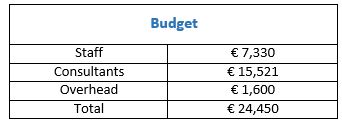
Planned Activities
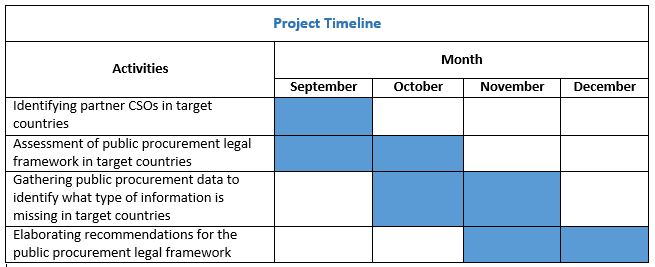
Contract
Grant agreement
|
The project aims to assess Public Procurement Legislations and their implementation in Zimbabwe, Tanzania, Kenya, Malawi, Indonesia, Philippines, Guatemala, Bolivia and Costa Rica with the use of the Transparent Public Procurement Rating Methodology to map the readiness of the target countries to adopt contemporary, modern and efficient public procurement systems, based on open data and the principle – “everybody sees everything”.
View more →
|





















